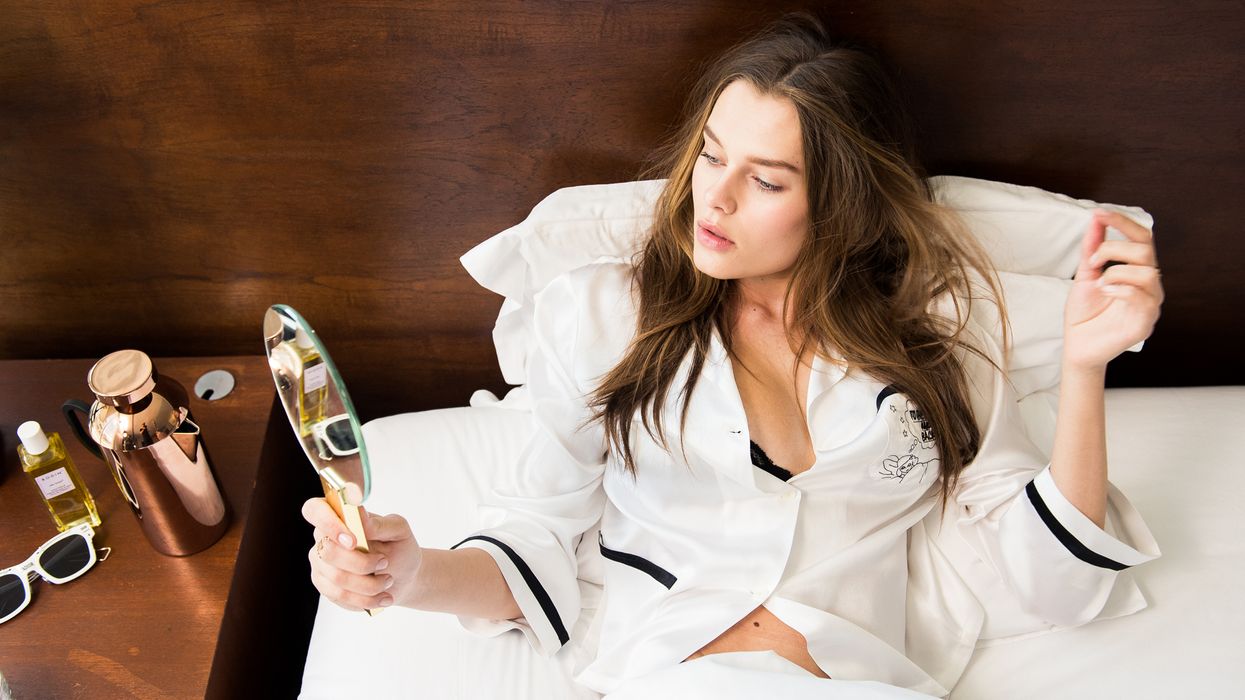Let’s Talk about Having Acne as a Working Adult
Plus the best options to banish breakouts for good.

When I graduated from college, I walked away with both a shiny new diploma and a full face of acne. While I’d had run-of-the-mill teenage breakouts, it was nothing a little Differin and concealer couldn’t fix. But when I decided to stop taking birth control right before graduation, the breakouts returned, more aggressive than ever before. Suddenly I was 13 again, but this time I wasn’t in the trenches with other preteens—I was surrounded by an office full of smooth-faced adults.
Of course I had a few coworkers who struggled with acne, but instead of feeling some sort of camaraderie with them, it made me feel worse. Their desire to exchange notes on facials and dietary changes only confirmed my worst fear—that other people noticed how bad my skin looked. A coworker eventually mentioned that the woman who held my job before had bad acne, too. “Maybe there’s something about this position that causes breakouts,” she wondered aloud. “Cleaning your desk phone might help.” How about I crawl under my desk and stay there forever? Thanks.
Now that I’ve had a little time for my skin, and ego, to recover, I can see more clearly that adult acne is an issue that affects many professional-age women. Eighty-five percent of people between ages 12 and 24 experience at least minor breakouts on occasion. But add that to my 5'2" frame, and you can see why I felt especially uneasy in my older, primarily male office.
Dr. Robin Evans of Southern CT Dermatology informed me that women in their 20s, 30s, and even 40s comprise a large portion of the patients she treats for acne. “For some women, it’s a continuation of their teenage acne that stretches into these later years, but for [others] it’s actually new onset acne.” While the hormonal changes you experience can cause breakouts, she noted that stress and genetics can also play a role. Even your diet—meaning excess sugar, dairy, and junk food in general—can potentially exacerbate acne. “I will offer food sensitivity blood testing for my adult female acne patients, and often I will find dietary links.”
To make matters worse, a study from The Journal of Clinical and Aesthetic Dermatology found that more than 75 percent of the female participants felt that acne lowered their confidence, and more than 10 percent of those surveyed admitted to missing work or school recently because of a breakout. Almost half said they had difficulty concentrating because of acne, and even more surprising, 17.8 percent reported changing their jobs or their job function after the onset of acne. Those are some pretty bleak stats, but they also shed much-needed light on the fact that I wasn’t the only one who struggled with acne in a big way. As an adult, it can be easy to brush off acne as a “vanity” issue, but given these findings, that’s simply not the case.
Luckily, acne doesn’t last forever, but if it is something you’re struggling with now, there are treatments available. Dr. Evans recommends adult patients try topical medications and oral antibiotics, unless you are pregnant or trying to conceive. Those women should stick with over-the-counter glycolic acid products, topical erythromycin (a prescription antibiotic), and topical azelaic acid. Otherwise, she does advise that prescription acne products will be more effective than something over-the-counter. But if that isn’t currently an option—or you need to pick up something on the fly—salicylic acid or benzoyl peroxide is your best bet. Either way, speak with a dermatologist who can best recommend a course of treatment for you and your skin.
There are also oral medications that can help curb hormonal acne specifically (if you’ve recently switched your birth control method, you might be dealing with this unwelcome side effect). I take spironolactone, an antihypertensive medication, which has been the only treatment to keep my acne in check despite trying various topical products.
For additional treatment options, consider visiting a dermatologist for a laser or light treatment, which help kill the acne-causing bacteria and remove dead skin cells (as well as treat lingering scarring after the acne has healed). And when all else fails, you can always visit your doctor for a cortisone shot to deflate a particularly aggressive cyst. More than anything, consistency is key. Know that by sticking with a non-irritating skin-care routine, and by cutting yourself some slack, the breakouts will stop one day.
Photo: Shot on site at 6 Columbus, a Sixty Hotel On Solveig: Pajamas, Morgan Lane; Ring, Baker & Black; Sunglasses, Dior; Hand Mirror, Tom Dixon; Carafe, Tom Dixon; Hair, Angela Soto; Make-up, Andriani.
Want more stories like this?
7 Beauty Editors on How They Get Rid of Acne, Fast
An Expert Guide to Treating Every Kind of Acne Scar
The 7 Best Pimple Patches to Heal That Blemish ASAP